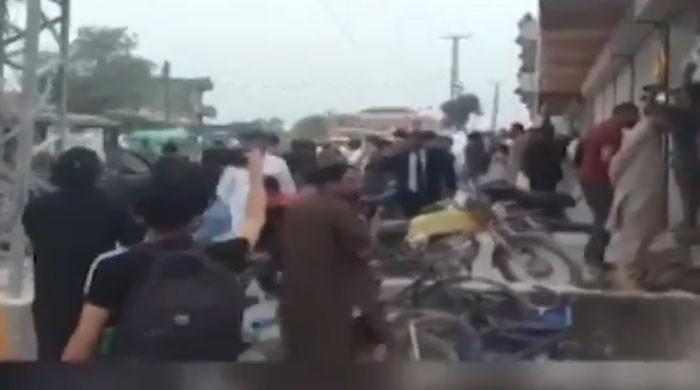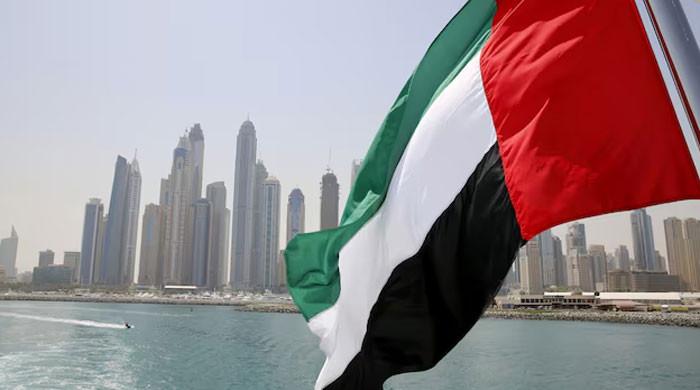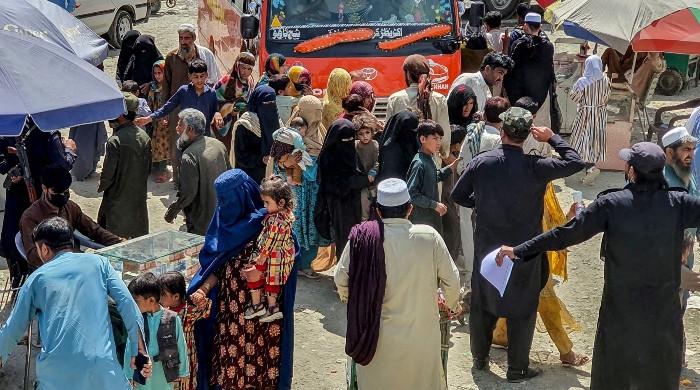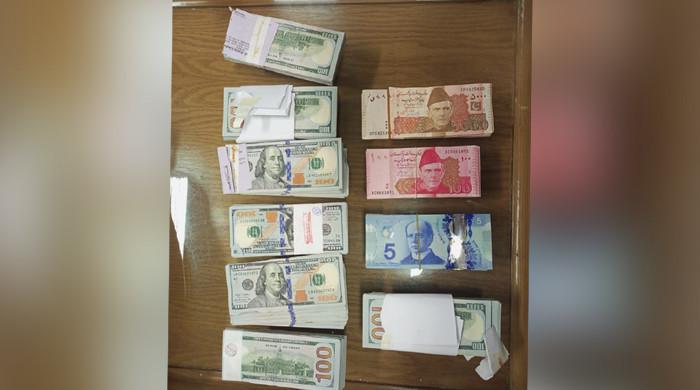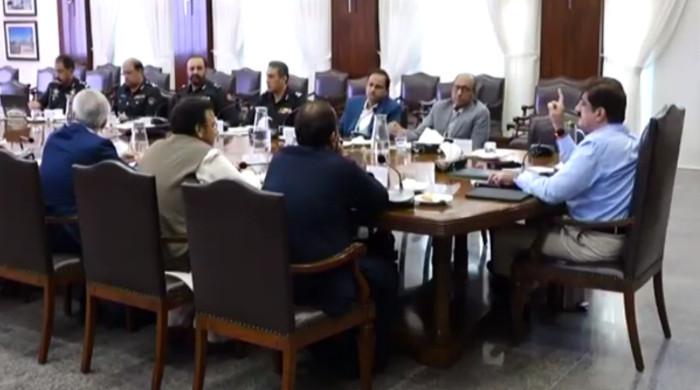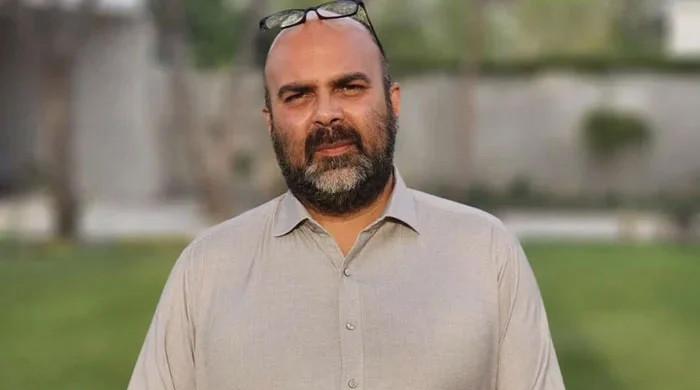Justice (retd) Ejaz Afzal defends Nawaz Sharif's disqualification judgment
Former senior judge says military personnel were included in the inquiry to avoid PML-N govt's intervention
November 04, 2024
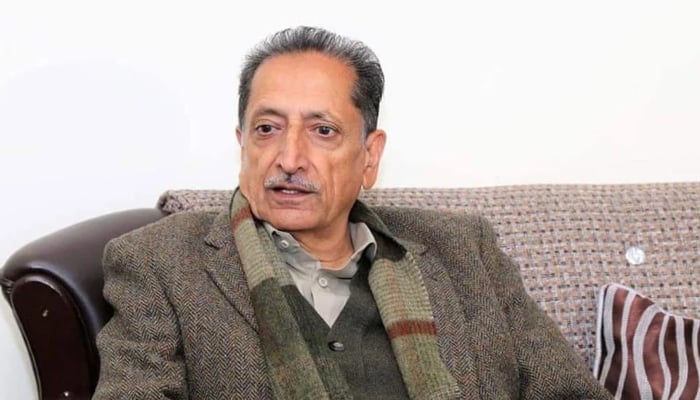
- Justice (retd) Ejaz was one of judges in Panama Papers case.
- He says he's once been approached by senior military official.
- He's convinced that Nawaz Sharif ought to be disqualified.
ISLAMABAD: While confirming that the Joint Investigation Team (JIT) members in the Panama Papers case were selected by the Supreme Court judges, Justice (retd) Ejaz Afzal Khan defended his verdict to disqualify former prime minister Nawaz Sharif.
He said that in order to avoid any intervention from the Pakistan Muslim League-Nawaz (PML-N) governemnt, a WhatsApp call was made and military personnel were included in the inquiry.
One of the five judges on the Panama Papers bench, Justice (retd) Ejaz, for the first time discussed his ruling in the case, the establishment of the JIT, and the selection of its members. In addition, he talked about the case's merits and offered his opinions on current judicial crisis faced by the nation.
Ejaz has never talked to media since he retired in May 2018, but he has now finally discussed the Panama Papers case for the first time. He was one of the five judges in the Panama Papers reference who demanded a comprehensive inquiry by a JIT.
The former senior judge was convinced that Nawaz ought to be disqualified for neglecting to reveal the salary that was due from his son, based on the JIT's conclusions.
This correspondent had an in-depth discussion with the retired judge. The judge was asked if it was true that the members of the JIT in the Panama Papers case were chosen via a WhatsApp conversation, as claimed by media reports. He was also asked if the call was made by Justice (retd) Azmat Saeed Sheikh or someone else and if some heads of institutions were directed to send specific names.
The retired judge elaborated the procedure while acknowledging that a WhatsApp call was made. He clarified that the Supreme Court judges thought the then-government's suggested nominees for the JIT were "approachable," which could compromise the inquiry. Ejaz clarified that they only asked for a list of officials with the highest integrity to guarantee impartiality, adding, "We didn't ask for any specific names."
He said that Justice (retd) Azmat had directed the Supreme Court Registrar to request for reliable senior officials from departments rather than making the call himself. Concerns regarding government influence were brought up by Ejaz, who noted that authorities such as the SECP chairman had close relations to Nawaz and questioned their impartiality in such a delicate investigation.
Ejaz was questioned about appointment of Inter-Services Intelligence (ISI) officials for the JIT’s security as well as two military officials' inclusion as JIT members. He was asked about the story of journalist Ahmad Noorani, who contacted Ejaz to ask for his thoughts. Noorani later received a notice regarding contempt of court for that.
To this, Justice Ejaz confirmed Noorani had contacted him. “He asked me about this, and I just told him we speak through our judgments,” Justice Khan said, adding that his statement on the issue was also aired by Shahzeb Khanzada in his show.
Regarding the selection of military officials for the JIT, he explained, “We chose military officials because those from other agencies were approachable. We wanted a fair investigation.” When asked if these military officials were part of the Dawn Leaks JIT, he responded he didn’t know but noted that the Sharif family could have filed a complaint if they had concerns about this issue.
When asked if any military general had ever contacted him during the Panama Papers case, Ejaz said, “I have never been approached by any military general, except once.” He then recalled an incident from his time as Chief Justice of the Peshawar High Court.
Ejaz shared that a brigadier had called him, saying the Corps Commander Peshawar wanted to meet him. “I told him I would be in my chamber until 11 pm,” the retired judge recalled.
“Half an hour later, he called again and asked, ‘Can’t you walk down to the flagstaff house?’ I told him this is not a walk down, it’s a walk up, and I’m not accustomed to walking up.” Soon after, he received another call informing him that the Corps Commander would visit his chamber by 8pm.
During the meeting, Justice Ejaz explained, they discussed routine matters until the Corps Commander changed his tone. “He said, ‘Mr Justice, do you think your rule of law will change the country? We arrest people, and you let them go.”
Ejaz responded firmly, saying: “As long as I am here, I will follow the law and go by the book. I will never convict anyone without evidence. If you have the power to change that, do so.” The general replied that he knew Ejaz well but could not forget past incidents of terrorism. Ejaz told him he sympathised but would not convict anyone unless proven guilty. “This was my only encounter with any general,” he concluded.
When asked if the judges in the Panama Papers case summoned then-NAB chairman Qamar Zaman Chaudhry to file an appeal against the high court’s decision in the Hudaibiya case, he confirmed that during the Panama Papers case, the judges had Chaudhry about the Hudaibiya Paper Mills case. “I told him it was a solid investigation, but it had been quashed by the high court during the investigation stage, which legally should not happen,” he explained.
He said that he asked Chaudhry if he planned to appeal the high court’s decision, but Chaudhry declined. Later, when Justice (retd) Javed Iqbal was appointed as NAB chairman, he filed the appeal in the Supreme Court, where it was assigned to Justice (retd) Qazi Faez Isa. However, Justice Isa dismissed the appeal due to limitation.
Ejaz remarked that the appeal had strong grounds for condonation of delay, noting that Chaudhry, appointed by the Sharifs, would have been unlikely to file an appeal against them. Justice Iqbal, the new chairman, filed it with condonation of delay as a basis, which Ejaz felt was valid, but Justice Isa still dismissed it.
When asked if it was legally right for the Panama bench to appoint Justice Ijaz ul Ahsan as a monitoring judge, Ejaz explained that monitoring judges are often appointed in many cases, including terrorism cases.
However, when this correspondent pointed out that monitoring judges in lower courts are appointed by the High Court, not the Supreme Court, he clarified that the Supreme Court can also give instructions to ensure cases are decided in a timely manner. Justice Khan said he did not know if Justice Ijaz ul Ahsan had any personal issues with the Sharifs but added that objections should have been raised if there were any.
About Nawaz’s acquittal in the Panama Papers case, Ejaz believes the case against the PML-N supremo was not a case for acquittal. It was prosecuted very badly, he added.
When asked about the disqualification of Nawaz for not declaring the salary from his son, which he never received, Ejaz explained that he had detailed the matter in his judgment.
He pointed out that problems arise when people comment without reading the judgment. According to Ejaz, Nawaz Sharif obtained an Iqama and signed an agreement that entitled him to a salary of 10,000 dirhams per month after being elected chairman of his son’s company’s board of governors in 2006.
Justice Ejaz stated that their legal team was asked about the Iqama, the employment agreement, and the salary details. He noted that Nawaz’s legal team, led by Khawaja Haris, confirmed the existence of these documents.
Importantly, he explained that the salary was not only accrued but also accumulated over time. When the court inquired about the current status of the salary, the legal team replied that in January 2013, Nawaz’s son informed his father of his intention to close the company. Nawaz then stated that the entire salary amount, which had reached approximately Rs30 million by that time, would belong to his son.
Ejaz further highlighted that the Representation of People’s Act, Section 12 (2), requires individuals to declare their assets as they stood until June 30 of the preceding year.
Thus, Nawaz was obligated to declare his assets, including the receivable salary, which had accrued until June 30, 2012. Since the salary was both accrued and accumulated and was not disclosed, Ejaz noted that if it had been stated that the salary was transferred to the son in January 2012, it would not have been considered part of Nawaz Sharif’s assets.
About the current judicial crisis and the threats to the independence of judiciary, Ejaz commented, “Independence of judiciary cannot be guaranteed by constitutional provision. It cannot be even infused by your judgments too if you as a judge are not independent. You can’t be influenced by anyone.”




